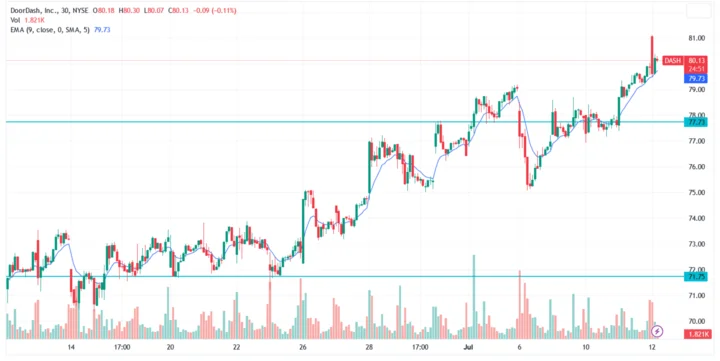Alright, buckle up, folks, because the headlines about DoorDash's recent earnings dip are missing the forest for the trees. Sure, the stock took a 9% hit after Q3 numbers came out, and yeah, they missed analyst expectations by a hair – 55 cents per share instead of the predicted 69. But focusing solely on that is like judging the Wright brothers' first flight based on how far they didn't go!
Let's dive deeper. Revenue increased 27% year-over-year. Total orders jumped a whopping 21% to 776 million. And net income? Up from $162 million to $244 million. Those aren't the numbers of a company in trouble; those are the numbers of a company investing in its future. It's like they're saying, "Okay, Wall Street, you focus on the short-term blip; we're busy building the delivery infrastructure of the future."
Think about it: they're pouring "several hundred million dollars" into new initiatives and development in 2026, building a brand-new global tech platform. This isn't just about delivering your pad thai faster; this is about reinventing the entire logistics landscape. And then there's the Deliveroo acquisition, expected to add a cool $200 million to adjusted EBITDA in 2026. It’s like acquiring the missing piece of a puzzle that unlocks a whole new dimension of possibilities. I mean, are we even considering the potential synergies?
And speaking of the future, let’s not forget Dot, their autonomous delivery robot. Remember that? September 2025. It's easy to dismiss these things as futuristic toys, but consider the implications. What happens when autonomous delivery becomes the norm? What happens when the cost of delivery plummets, and access to goods becomes democratized like never before? Are we ready for that shift?

Now, some might say, "But Aris, what about the missed expectations? What about the stock drop?" To them, I say: look at the bigger picture. Every great innovation has its bumps in the road. Remember when people scoffed at the internet? Remember when electric cars were considered a joke? This isn't just about delivering food; it's about building a resilient, adaptable, and ultimately more efficient delivery ecosystem.
Sure, there’s the depreciation and amortization expense of $700 million for fiscal year 2025 and a stock-based compensation expense of $1.1 billion. But even with these significant investments, DoorDash is positioning itself for long-term dominance. They’re not just playing the game; they're changing the rules.
Let's zoom out for a second. Imagine the printing press. Before it, knowledge was hoarded, controlled by the elite. The printing press democratized information, sparked revolutions, and ushered in a new era of enlightenment. DoorDash, in its own way, is doing something similar. It's democratizing access to goods and services, connecting people and businesses in ways we couldn't have imagined just a few years ago. What will be the effect of this democratization on society? What new opportunities will arise?
But with great power comes great responsibility, right? As we move towards a future of autonomous delivery and instant gratification, we need to think critically about the ethical implications. What about the jobs that might be displaced? How do we ensure that this technology benefits everyone, not just a select few? These are crucial questions that we, as a society, need to grapple with. When I first saw the potential of this tech, I honestly just sat back in my chair, speechless. This is the kind of breakthrough that reminds me why I got into this field in the first place.
The market may be reacting to short-term misses, but DoorDash is clearly focused on long-term growth. They're not just delivering meals; they're building the infrastructure for a future where anything, anywhere, can be delivered with unprecedented speed and efficiency. The stock's dip is a temporary setback, not a sign of impending doom. It is, in fact, an opportunity to see what the future of deliveries will look like.